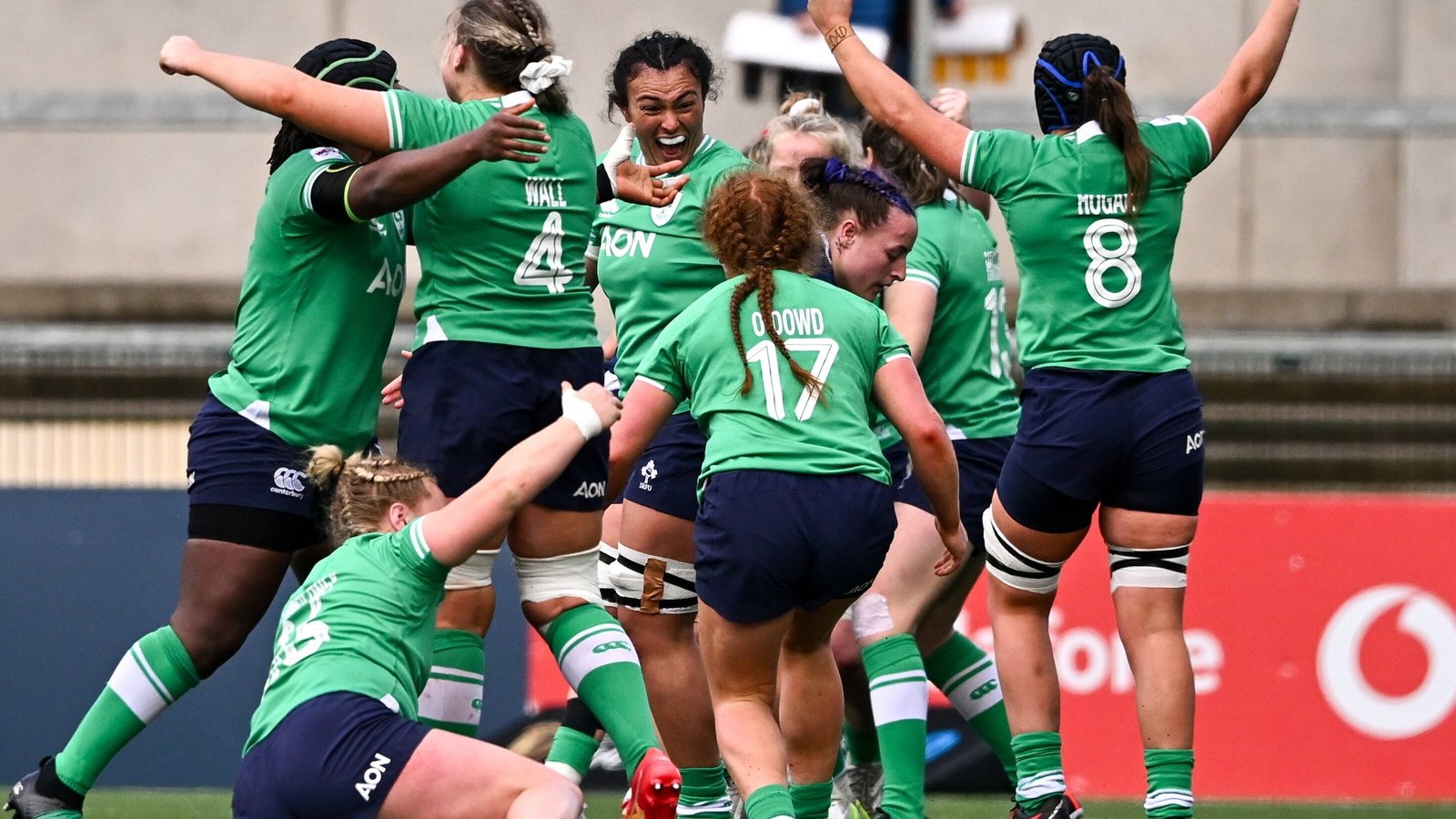From the back of the queue to the front of the line, Ireland women are set to take centre stage next weekend.
Scott Bemand’s side take on Australia in Belfast on Saturday as the Irish Rugby Football Unions kicks off a season celebrating its 150th anniversary.
A national team played England on 15 February 1875 and the union has promised a “calendar of events to celebrate the game of rugby in Ireland”.
Ahead of their WXV1 campaign in Vancouver later this month, the Ireland women’s team get to test their mettle against Australia, ranked fifth in the world.
It comes with the women’s game in the country on the up after a harrowing period between 2017 and last season.
Albeit working off a low base, the appointment of Gillian McDarby as head of women’s performance and pathways, the arrival of new coaching staff, the WXV3 success, qualification for next year’s World Cup, dozens of players on central contracts, the return of an exile, and an incredibly competitive and high-quality Interprovincial Championship, the game is in a better place than it has been in years.
But with that comes a warning: we’ve been here before.
A Grand Slam in 2013 was followed by a Six Nations title in 2015, with a World Cup semi-final in between.
Even the men chipped in, Joe Schmidt’s side won Six Nations titles in 2014 and 2015 and beat the All Blacks for the first time the following year.
The country was on a rugby buzz and with Ireland hosting the Women’s World Cup in 2017, everything looked set to push on and close the gap on pacesetters England and New Zealand.
But it all fell apart in spectacular fashion. It’s well-worn territory by now but worth a short recap.
By the time the 2017 World Cup came around things were going wrong in the background. An opening pool win over Australia was the team, with quality players, punching above their weight.
They finished the tournament in eighth place, missing out on automatic qualification for the next renewal.
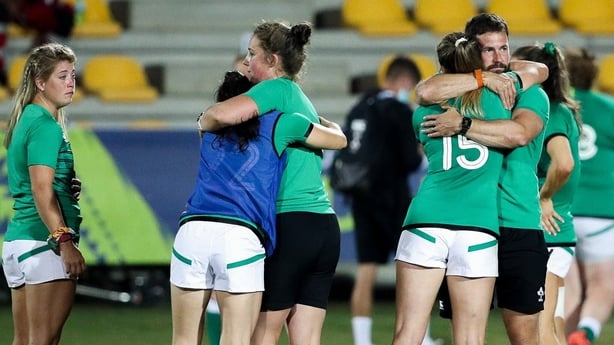
The fallout from the failure to qualify for the 2021 World Cup at the Parma repechage under then-head coach Adam Griggs saw a number of current and former players put pen to paper to say they had lost confidence in the union’s stewardship of their game.
The missive held nothing back.
The signatories – including Ciara Griffin, Clíodhna Moloney, Nichola Fryday, Lynne Cantwell, Sene Naoupu, Neve Jones, Eimear Considine, and current co-captains Edel McMahon and Sam Monaghan – said they had lost “all trust and confidence in the IRFU and its leadership after historic failings”.
They said recent events “simply reflect multiple cycles of substandard commitment from the union, inequitable and untrustworthy leadership, a lack of transparency in the governance and operation of the women’s game both domestically and at international level, and an overall total lack of ambition about what it could achieve.”
The union’s plans, they said, were in “disarray” and it was a “significant failure”.
There was a sense that Sevens was being given priority, even during Six Nations windows.
Two captains, Griffin and Fryday – both in their prime – retired from international rugby in the next two years and the team, under head coach Greg McWilliams, fell to a first wooden spoon since 2004.
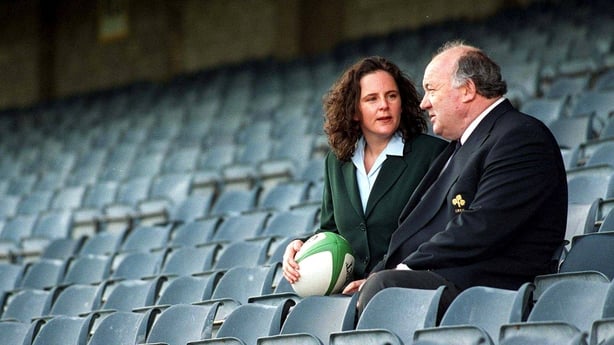
Few people did as much as Carole Ann Clarke to lay the foundations for the women’s game.
She served as president of the Irish Women’s Rugby Football Union before it affiliated with the IRFU in 2001. That was in addition to her role as Leinster and Ireland captain.
Clarke, then Byrne, captained Ireland when they first faced Australia in an international, the pool game at the 1998 World Cup in the Netherlands where trying to stop Pearl Palaialii was a full-time job.
“It was the first time we played a southern hemisphere team, and it was just the size disparity between the island girls and ourselves, their athleticism was really impressive,” Clarke tells RTÉ Sport.
“I was proud and a little bit overwhelmed with the realisation that we were in a World Cup with all these amazing teams.
“There was this attitude that ‘any step is a positive step’, and my attitude is we’ve been saying that for 30 years”
“We could feel the progress in that World Cup.
“The IRFU sent over a representative to view us with regards to how we would integrate into the IRFU and the level of commitment they would give us from a resource and financial perspective.
“I felt we did ourselves proud without any real sponsors or financial backing at the time.”
So how did one of the game’s trailblazers feel watching on as the foundations she laid were not built upon and left the players with no option but to put pen to paper in such an excoriating manner?
“I wasn’t surprised and I had been part of several letters previously,” says Clarke, now a youth co-ordinator with Blackrock College RFC.
“I really feel that diplomacy, negotiation and collaboration is the way to go, but we did reach the point where we went ‘enough is enough’.
“There was this attitude that ‘any step is a positive step’, and my attitude is we’ve been saying that for 30 years.
“It was at a time that the media had started to take notice, particularly after the success of the Grand Slam and beating New Zealand [at the 2014 World Cup].
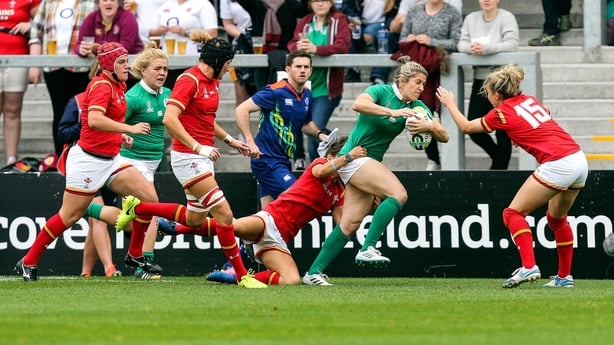
“There was great momentum leading up to the World Cup in 2017 and a huge opportunity for the IRFU to take a leap forward with the women’s game and they didn’t take that opportunity to do things right.
“I was very sad and when they didn’t qualify for the World Cup. I had tears, just sad for the girls, the coaching team and for everybody who’d contributed to that day, to the game, to get it where it was going.
“A certain level of frustration, I guess, that the girls were experiencing things that we had previously.
“We thought the game had moved on in terms of travel and commitment from the IRFU, and equally around the player contracts as well.”
Despite continued good performances in Premier Women’s Rugby for Wasps and then Exeter, Clíodhna Moloney spent 2022 and 2023 in exile after making a comment on social media about the IRFU’s then-head of women’s rugby Anthony Eddy in November 2021.
After returning to the squad under Bemand in this year’s Six Nations, the hooker is again included in this week’s camp, and believes the current landscape is “worlds apart”.
Clarke acknowledges that things are on the up and that good work has gone on in the last 12 months but also wonders why everything has to be so hard-fought.
She welcomes the news of the professional contracts but calls for even more to be done to attract and retain talent.
“I would just love it not to be such a struggle all the time,” she adds.
“I’ve been involved in the game for 30 years and it’s still a struggle to get where we want to be. It shouldn’t really take this long.
“I felt, and still believe, that [the contracts] are not fair.
“I don’t think that there’s enough of them and I’m not sure they are at the right level they need to be in terms of living wage and enjoying some financial benefits for the challenges that you go through to play for your country.”
Ireland, ranked tenth in the world, take on New Zealand, USA and Canada in the WXV1 at the end of the month and there’s likely some harsh, but valuable, lessons on the way.
The key is to embrace the challenges and not let the hard work go to waste.
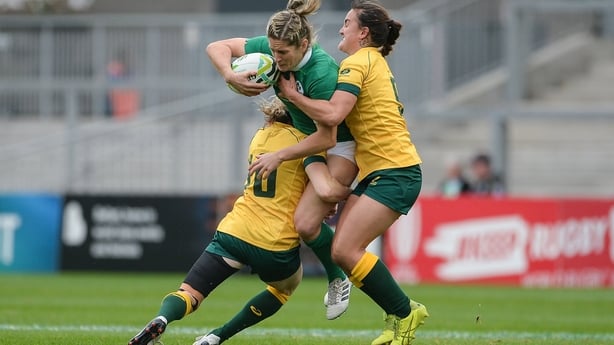
Former Ireland wing Ali Miller, a signatory of the 2021 letter, who retired in 2019 after scoring 24 tries in 47 games, says there can be no complacency this time about taking the next step.
“Look, it’s great where it is now,” says Miller, who played twice for Ireland against Australia at the 2017 World Cup.
“I’ve been impressed with Scott Bemand and his team.
“They said our aim was to finish third in the Six Nations and qualify for the World Cup, and bang, they did both. There’s a team that knows itself.
“In women’s sport you are always going to have to look for more.
“We appreciate where we’ve come from and the struggles we had, how good it is now but we [have to] push on, we don’t applaud ourselves too much.
“That’s just the mindset of any high-performance team, not to stand still.”
Follow the RTÉ Sport WhatsApp channel for the best news, interviews, analysis and features, as well as details of our sports coverage across all RTÉ platforms.

